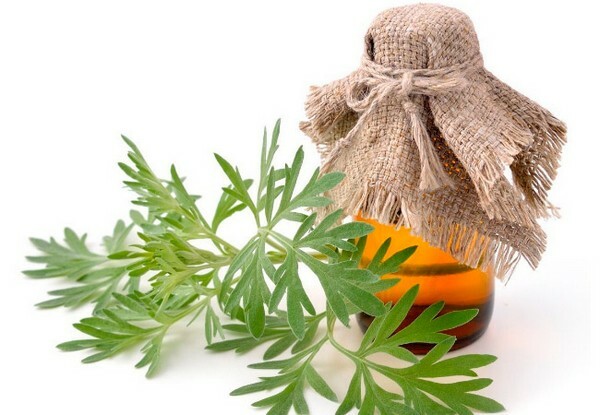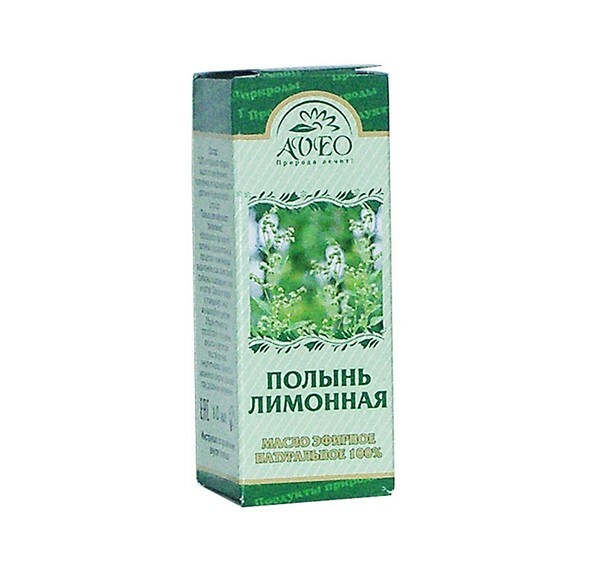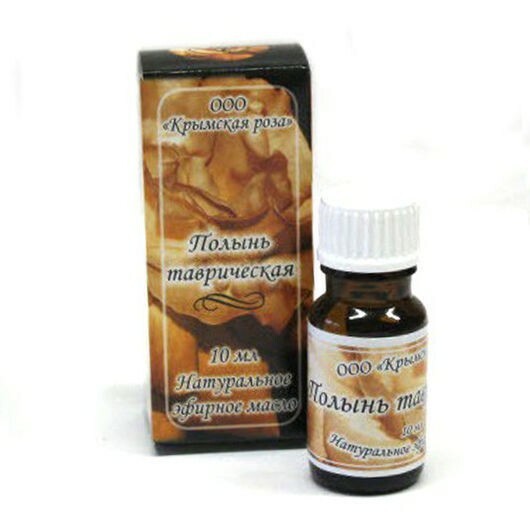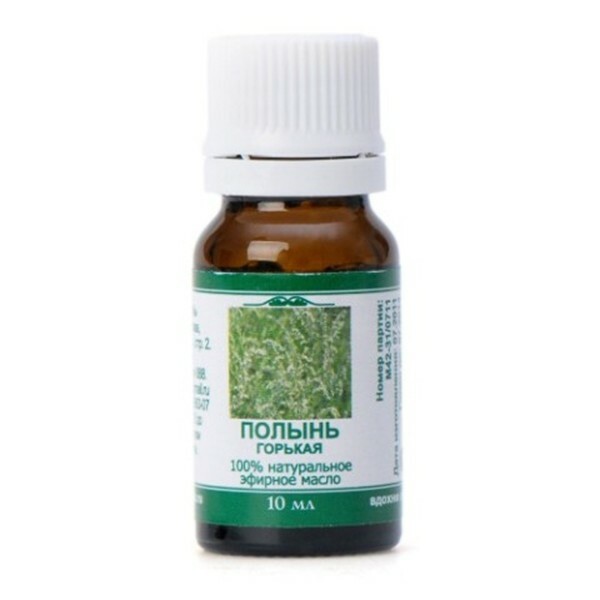- Species and chemical composition of Artemisia oil
- Preparation of Artemisia oil
- Application for medicinal purposes
- Application in cosmetology
- Application in aromatherapy
- Precautions
Plants of the genus Wormwood belonging to the family Astrological plants are biennial or perennial( rarely annual) grassesor semishrubs. In natural conditions, they can be found in North America, the temperate zone of Eurasia, South and North Africa. Some species of plants of this kind have long been widely used in folk medicine for the treatment of various ailments. It has been established that the medicinal properties of wormwood are mainly due to the high content of essential oils in it, consisting of biologically active components. They have a bactericidal, anti-inflammatory, tonic, immunomodulating, analgesic effect, increase the secretory activity of the gastrointestinal tract. Essential oil of wormwood is used not only for medical purposes, it is added to toilet water, creams and face masks, used for the aromatization of premises.

Species and chemical composition of Artemisia oil
The following kinds of wormwood are used for the production of essential oil:
- bitter;
- ordinary;
- is lemon;
- is an annual;
- ;
- estragon;
- is Taurian.
Each of them is characterized by its more or less pronounced properties, which is due to the qualitative and quantitative differences in the chemical composition. The content of essential oils in various species of wormwood varies from 0.1 to 3%.Their main components are the following volatile compounds:
- α- and β-thujone;
- cadinene;
- α- and β-pinene;
- phellandren;
- is azulene;
- camphene;
- 1,8- and 1,4-cineol;
- Artemisia-ketone;
- camphor;
- linalool and linalyl acetate;
- borneol;
- chamazulene;Myrcen
- ;
- α-terpinene, etc.
Wormwood oils of bitter, Taurian and common contain high concentrations of thujone, so they are used with great care. This compound is neurotoxic, with an overdose can cause uncontrolled aggression in a person, convulsions and hallucinations.
Interesting: Extract of wormwood bitter is part of the famous alcoholic drink Absinthe. It is the presence of thujone in this drink that leads to the fact that intoxication due to its reception resembles the action of drugs, causes stimulation and a change in consciousness.
Preparation of Artemisia oil
For the industrial production of essential oils of Artemisia, the aerial parts of the plant are used during the flowering period. The oil is extracted by distillation with water vapor. The distilled products have a density below the water, so as a result of the distillation they accumulate on its surface, after which they are separated and dried. Oils, isolated from different species of wormwood, differ in color, consistency and aroma. For example, one-year old wormwood oil has a fresh aroma reminiscent of cedar and other coniferous trees. For lemon wormwood oil, a pronounced citrus smell with fruit sweet notes is characteristic. Essential oil of wormwood tarragon has a fresh spicy smell with an anise note, and common wormwood does not have a specific smell.

With the help of vegetable oil extraction, essential oil of Artemisia can be isolated on its own at home. To do this, freshly picked vegetable raw materials, consisting of leaves, stems and flowers of the plant, dried in the oven, ground with scissors, put in a jar, poured with olive oil and tightly closed. Then vigorously shake and leave in a dark place. After 10 to 12 days, the mixture is filtered, placed in a cool place and, if necessary, used for its intended purpose. The preparation prepared in this way is a solution of essential oil of wormwood in olive oil and should have a dark green hue.
Application for medicinal purposes
Essential oil, extracted from wormwood, has valuable healing properties and can be used for various diseases. The spectrum of biological activity and the degree of its expression are different for each species, which is due to different chemical composition. Nevertheless, for all species used in folk and traditional medicine, the general medicinal properties are characteristic. These include:
- stimulation of secretory activity of the gastrointestinal tract;
- antimicrobial and antiseptic effect in ARVI, cold and their complications;
- improved appetite;
- analgesic effect for headache, pain in muscles and joints;
- regulation of hormonal disorders( menopause, menstrual irregularities);
- tonic and strengthening effect on the nervous system, effectiveness in insomnia and depressive states;
- anti-inflammatory effect.
In addition to the general properties, each oil has its own characteristics and applications.
Interesting: The tonic properties of essential oil of wormwood were known even in ancient times. Roman soldiers during the difficult and lengthy transitions tied to the boots bunches of wormwood, which increased their endurance and relieved fatigue.
Oil of wormwood Taurian
Oil isolated from wormwood Tavricheskoe, effective for certain diseases of the heart. It is used as a cardiotonic agent, reduces shortness of breath and heart rate, while increasing their amplitude, has an exciting effect on the cerebral cortex, enhances excitation processes in the central nervous system.
Tauric wormwood oil helps with seasickness, has a tonic and detoxifying effect, increases vitality, relieves emotional tension, is a powerful aphrodisiac and increases sexual activity in both men and women.

This remedy is indicated for circulatory problems, infections in the digestive tract, diarrhea, convulsions. For massages and rubbing it is used for rheumatism. With caution, because of the high concentration of thujone, it can be applied externally to lubricate the throat with angina, rinses with infections in the mouth and throat and lotions with hemorrhoids.
Lemon worm oil
Lemon wormwood oil, unlike all others, does not have a thujone, therefore it is considered to be the safest and most used for medical purposes. It is used for massage, baths, rubbing, rinsing, compresses and appliqués. The healing properties of lemon wormwood oil help with the following problems:
- headache;
- ARVI and colds;
- purulent wounds and ulcers;
- of gastrointestinal disease;
- of jaundice;
- intoxication;
- neurasthenia;
- helminthic invasion;
- rheumatism, etc.
With external use in the form of compresses, the agent promotes prompt resorption of bruises and bruises, relieves pain and swelling with sprains, relaxes muscles.
Application in cosmetology
Some kinds of essential oils of Artemisia have found application in cosmetology for the solution of various problems. They are added in small amounts( 2 drops per 10 ml of the base) to the ready-made cosmetology products for giving antiseptic and anti-inflammatory properties, as well as a pleasant spicy odor. Especially effective are masks, creams and lotions with this component for owners of oily and combination skin types prone to frequent rashes. Tauric wormwood oil promotes normalization of cellular metabolism in skin tissues, refreshes the skin, removes greasy shine, helps with acne. The most pronounced antiseptic properties are lemon wormwood oil, the use of which accelerates the healing of wounds and scars, and the tarragon wormwood soothes and tones the skin, relieves itching. The most pronounced rejuvenating effect is the essential oil of wormwood bitter, it tones up the skin, tightens, softens it and smooths the relief of the face.

Also, wormwood oil is used to care for nails, hair and oily scalp. It gives hair a natural shine, a well-groomed and healthy appearance, increases their elasticity. It can be added to hair masks and rinsing solutions after washing the head.
Some types of wormwood oils are used in perfumery and are included in toilet waters, colognes and perfumes to give them a more interesting flavor.
Application in aromatherapy
Essential oils of wormwood are widely used for the aromatization of premises. Adding them to the aroma lamp and inhaling the vapors released has the following psycho-emotional effect on the body:
- relieves irritability and nervous tension;
- enhances sexual desire;
- calms the nervous system, improves sleep;
- protects from bad thoughts;
- tones and relieves fatigue.
To their useful properties for the aromatization of premises can also be attributed to the elimination of unpleasant odor from domestic animals, protection from fleas and other insects. They not only perfectly refresh the air, but also reduce the number of pathogenic microorganisms in it.
Interestingly: For a long time, the fragrance of wormwood was used to destroy insects( cockroaches, fleas and bedbugs), fumigating it with living quarters and hanging brooms from this grass in the huts.
Precautions
Despite the large number of valuable properties, the essential oils of Artemisia are highly toxic, therefore, their use must be treated with care, so as not to accidentally damage the body. It is especially important when using them for the treatment of some diseases. Before starting such therapy, you should always consult with a specialist. Contraindications for the use of essential oils of wormwood for any purpose are:
- pregnancy and lactation;
- individual intolerance or plant allergy;
- severe heart disease;
- epilepsy.
Overdose may cause dizziness, premature events, hallucinations, and other side effects.
On the healing properties of wormwood:
